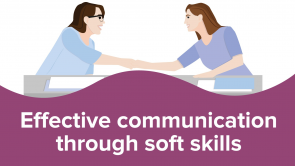Presentation skills (part 2): delivery and review

Über den Vortrag
Der Vortrag „Presentation skills (part 2): delivery and review“ von Michael Schmitz ist Bestandteil des Kurses „Effective communication through soft skills“. Der Vortrag ist dabei in folgende Kapitel unterteilt:
- S10: Completion
- S11: Risk analysis
- Avoiding mental blocks
- Better Delivery
- Delivery: Confidence/Body Language
- Delivery: Handling mistakes
- Delivery: The audience
- Better Review
- Review tools
- Summary
Quiz zum Vortrag
Mental blocks: What is not correct?
- They are a problem that can only be endured.
- They are normal whenever we prepare a complex topic. Writing down some keywords with a pen helps in removing them.
- They are normal whenever we prepare a complex topic. Writing down some keywords on the computer helps in removing them.
- They commonly occur when we think on a too high level.
What are the last two steps for a better preparation?
- Completion (shortening, searching for images, proofing, QA etc.)
- Risk analysis
- Deciding on what to wear (suit, T-shirt etc.)
- Preparation analysis
What are the three challenges you may face?
- Confidence and body language
- Mistakes
- The audience
- Bad weather
- Sleep deprivation
Being nervous ...
- is probably an evolutionary response to prepare us for our task. It can be helpful in becoming a better presenter.
- increases our concentration and can never be a disadvantage.
- can be limited through training until it vanishes completely.
- is probably an evolutionary response to prepare us for our task. It cannot be helpful in becoming a better presenter.
Once we enter the stage ...
- we need to provide a cultural frame for the audience and tell them about their expected behaviour.
- we can rely on the audience to tell us how to behave.
- we need to motivate the audience and do exactly what they expect.
- we should not provide a cultural frame for the audience or tell them about their expected behaviour.
Mistakes happen ...
- and we will stay calm and confident: as long as we are not worried, the audience is not worried.
- only to unprepared people.
- need to be planned and practiced.
- only to amateurs.
What should you consider when analyzing and reviewing your performance?
- The best and most difficult moments, good content, behavior that went well and what could be improved
- The best and worst moments, good content, behavior that went well and wrong
- The best moment, good content, behavior that went well
- The best and scariest moments, good content, behavior that went well and what could be improved
What are other possibilities to analyze your performance and how much time should you spend on the review?
- Other possibilities are feedback sheets for the audience, video recording, audio recording, audience reaction, personal feedback or a professional trainer. You should spend about an hour on the review.
- Other possibilities are feedback sheets for the audience, video recording, audio recording, audience reaction, personal feedback or a professional trainer. You should spend about two hours on the review.
- Other possibilities are feedback sheets for the audience, video recording, audio recording, audience reaction, personal feedback by your family or a professional trainer. You should spend about two hours on the review.
- Other possibilities are feedback sheets for yourself, video recording, audio recording, audience reaction, personal feedback or a professional trainer. You should spend about an hour on the review.
Diese Kurse könnten Sie interessieren
Kundenrezensionen
5,0 von 5 Sternen
| 5 Sterne |
|
5 |
| 4 Sterne |
|
0 |
| 3 Sterne |
|
0 |
| 2 Sterne |
|
0 |
| 1 Stern |
|
0 |



